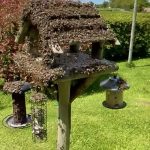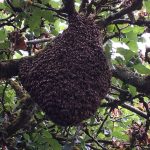May and June are the peak season for honey bee swarms. But what should you do? Read on to see how we can help.
If you see the marvellously natural sight of thousands of bees flying through the air, this is swarming. Eventually they may choose to alight in your favourite tree or garden bush. The group of bees is know as a cluster and can land on your bird table.

What should I do if I think I have seen a honeybee swarm?
Remain calm, it is also sensible to keep your distance, and keep children and pets indoors. Remember, these vital pollinators need care and not a pest controller. It is much better for the bee’s survival if you phone your local beekeeping association below to collect them.
You can anticipate the bee swarm will rest for between a few hours. It can be as long as 2 days before their scout bees come back to tell them others where their new home will be.
Firstly, a colony of bees prepares to swarm for a few reasons. Firstly, when they are raising lots of baby bees and it is getting a little crowded in their original hive. Secondly, they may decide the queen is getting old and create new queens within the hive. Rather than fight it out the old queen leaves, with half the hive! That could be between 1,500 and 30,000 bees including workers (female bees) and drones (male bees).
Secondly, and most interestingly, the bee’s little tummies will be engorged with honey for their flight. Because of this they will be in a docile, passive state of mind. In addition, they do not have a home to defend!

Who Can Collect Dorset Honeybee Swarms?
East Dorset Beekeepers have a Swarm Coordinator who you can contact via our website’s swarm map page. They will try to find one of our friendly volunteer beekeepers who may be able to come to your home and carefully collect honey bees, for free.
You will be asked a number of questions to help you identify if you have honeybees, or if you are describing the nest of wasps or hornets, a photo helps. Please be ready with your address, postcode, phone number and the location of the swarm in case we need to bring a ladder! You can learn a lot by watching from a safe area, preferably indoors.
To get the information, and who to call, check out our interactive map on our new EDBKA website.

Who Can Collect Dorset Honeybee Swarms? Written: 12th May 2023

